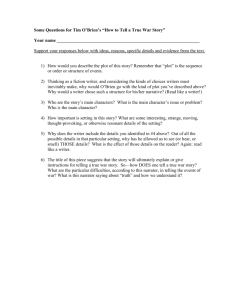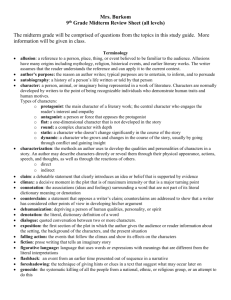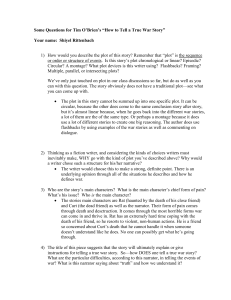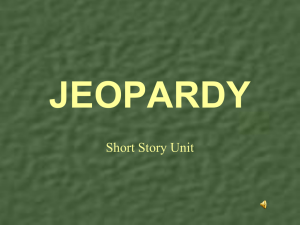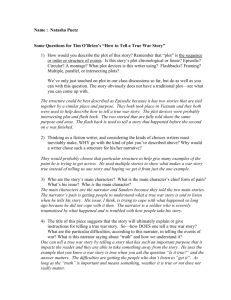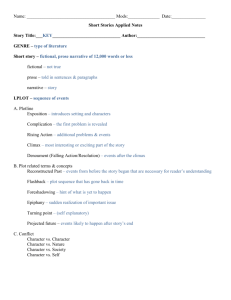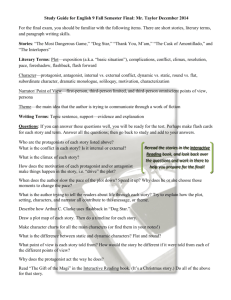English Academic & Literary Terms - High School
advertisement
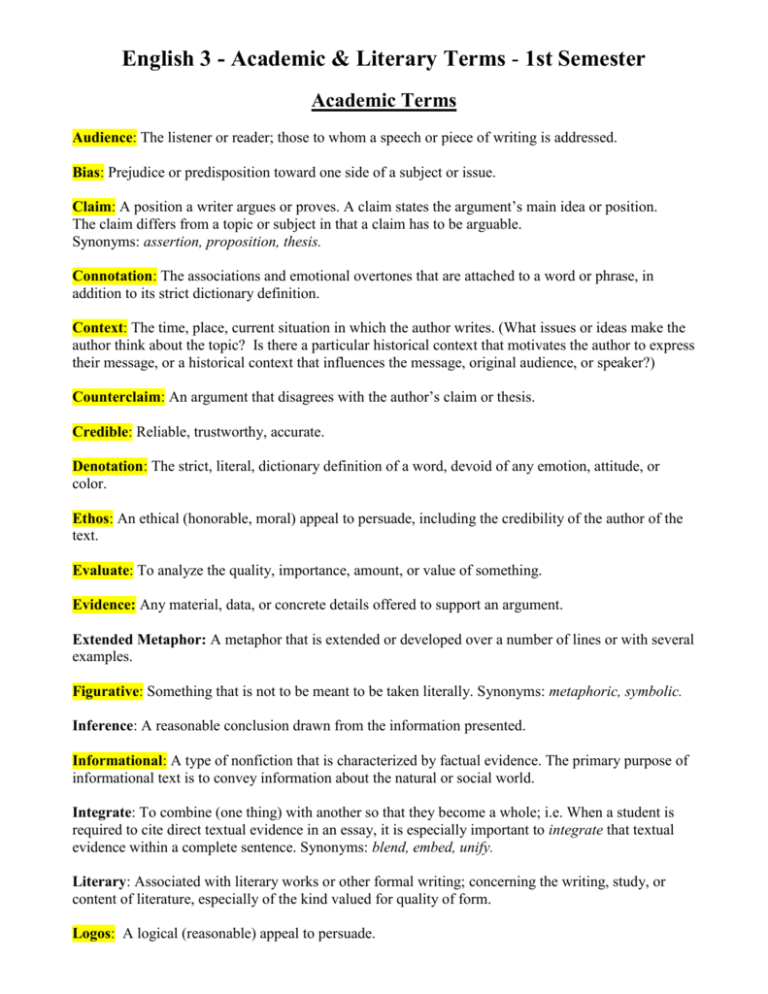
English 3 - Academic & Literary Terms - 1st Semester Academic Terms Audience: The listener or reader; those to whom a speech or piece of writing is addressed. Bias: Prejudice or predisposition toward one side of a subject or issue. Claim: A position a writer argues or proves. A claim states the argument’s main idea or position. The claim differs from a topic or subject in that a claim has to be arguable. Synonyms: assertion, proposition, thesis. Connotation: The associations and emotional overtones that are attached to a word or phrase, in addition to its strict dictionary definition. Context: The time, place, current situation in which the author writes. (What issues or ideas make the author think about the topic? Is there a particular historical context that motivates the author to express their message, or a historical context that influences the message, original audience, or speaker?) Counterclaim: An argument that disagrees with the author’s claim or thesis. Credible: Reliable, trustworthy, accurate. Denotation: The strict, literal, dictionary definition of a word, devoid of any emotion, attitude, or color. Ethos: An ethical (honorable, moral) appeal to persuade, including the credibility of the author of the text. Evaluate: To analyze the quality, importance, amount, or value of something. Evidence: Any material, data, or concrete details offered to support an argument. Extended Metaphor: A metaphor that is extended or developed over a number of lines or with several examples. Figurative: Something that is not to be meant to be taken literally. Synonyms: metaphoric, symbolic. Inference: A reasonable conclusion drawn from the information presented. Informational: A type of nonfiction that is characterized by factual evidence. The primary purpose of informational text is to convey information about the natural or social world. Integrate: To combine (one thing) with another so that they become a whole; i.e. When a student is required to cite direct textual evidence in an essay, it is especially important to integrate that textual evidence within a complete sentence. Synonyms: blend, embed, unify. Literary: Associated with literary works or other formal writing; concerning the writing, study, or content of literature, especially of the kind valued for quality of form. Logos: A logical (reasonable) appeal to persuade. Pathos: An emotional (sentimental) appeal to persuade. Purpose: The reason why the author writing. (The purpose could be purely a personal one; i.e. to assuage guilt, to encourage action. But it could also be directed at the audience; you will have to decide what the message is and how the author wants their audience to respond.) Qualification: A statement that limits or restricts some claim in meaning, scope, or strength; words or phrases that limit the scope of a claim, making it less absolute. Examples: in a few cases, sometimes, under these circumstances, usually, etc. Refute: To disprove an argument. In an argumentative essays, students will refute opposing claims in their counterclaim paragraphs. Revision: The process of rereading a one’s written work and making changes (in content, organization, sentence structures, and word choice) to improve it. Rhetoric: From the Greek for "orator," this term describes the principles governing the art of writing effectively, eloquently, and persuasively. Text Structure: The term “text structure” refers to how information is organized in a passage. The structure of a text can change multiple times in a work and even within a paragraph. Examples: cause & effect, chronological, compare/contrast, description, problem/solution, etc. Tone: The attitude a writer takes toward a subject or a character. The writer’s choice of words (diction) and plot details help convey tone. Examples: bitter, humorous, ironic, objective, playful, sarcastic, serious, etc. Literary Terms Anti-Hero: A protagonist whose distinctive qualities are directly opposite of the traditional hero. This opposition does not necessarily imply that the character is evil or bad. This often reflects the author’s belief that modern life no longer tolerates or produces individuals capable of classic and genuine heroism. Bildungsroman: [German] A coming-of-age story. A novel in which an adolescent protagonist comes to adulthood by a process of experience and disillusionment. This character loses his or her innocence, discovers that previous preconceptions are false, or has the security of childhood torn away, but usually matures and strengthens by this process. Characterization: The process by which the writer reveals the personality of a character. ● Direct: The writer directly tells the audience what the character is like. ● Indirect: The writer shows the character's personality by: describing how the character looks and dresses; letting the audience hear the character speak; revealing the character’s private thoughts and feelings; revealing the character’s effect on other people - showing how other characters feel or behave toward the character; showing the character in action. Double Entendre: [French] A word or phrase with more than one meaning, usually when the second meaning is sexual. Foreshadowing: The use of hints and clues to suggest what will happen later in a plot. Frame Narrative/Novel: A story within a story. Inserting a plot within the body of a larger plot that encompasses the other one. Picaresque: A literary genre that is related to an episodic style of fiction that deals with the adventures of a rough and dishonest but appealing hero. It is a romantic and an adventure story that is marked by realism in petty detail and by uninhibited expression. The picaro (protagonist) provides satire of the social classes through various pranks and predicaments and by his association with random characters. Point-of-View: The vantage point from which the writer narrates a story. ● First-Person: Using first-person pronouns such as I and we, one of the characters in the text relates all the action in the plot. ● Third-Person: Using third person pronouns such as he or she, an outside narrator relates all action in the plot. Third person point of view may be omniscient or limited. ● Limited: The narrator plays no part in the plot, yet zooms in on the thoughts and feeling of just one character. This point of view limits the audience to the perceptions of one character, but because the narrator is outside of the story (unlike a first person narrator) they can tell the audience many things about the character, things that the character himself (or herself) might be unaware of. ● Omniscient: An omniscient or “all-knowing” narrator that can, therefore, reveal any manner of things about the plot, characters, motivations and thoughts or feelings of any character . Satire: The use of humor, irony, exaggeration, or ridicule to expose and criticize people’s shortcomings (individual or societal problems). Ideally, satire invokes change. Stream-of-Consciousness: A style of writing that portrays the inner (often chaotic) workings of a character’s mind. It usually consists of a recording of the random flow of ideas, memories, associations, images, and emotions, as they arise spontaneously in a character’s mind. Theme: The insight about life that is revealed in a literary work. It is the statement the writer wants to make about a subject. Theme is different from subject. i.e.: A subject might be “growing up,” and a theme about that subject might be: “For most young people, growing up is a process that involves the pain of achieving self-knowledge.” Unreliable Narrator: Narrator who is not always perceptive about what is happening in the plot, or someone who is deliberately lying. *Highlighted Terms = On 1st Semester Final Exam!
